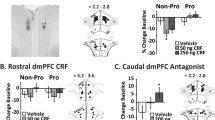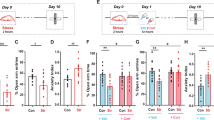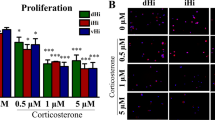Abstract
There is evidence that in rats, partial hippocampal lesions or selective ablation of the CA3 subfield can disrupt retrieval of spatial memory1 and that hippocampal damage disinhibits hypothalamic-pituitary-adrenocortical (HPA)-axis activity, thereby elevating plasma levels of adrenocorticotropin and corticosterone2,3. Here we report evidence that attenuation of CA3 lesion-induced increases in circulating corticosterone levels with the synthesis inhibitor metyrapone, administered shortly before water-maze retention testing, blocks the impairing effects of the lesion on memory retrieval. These findings suggest that elevated adrenocortical activity is critical in mediating memory retrieval deficits induced by hippocampal damage.
This is a preview of subscription content, access via your institution
Access options
Subscribe to this journal
Receive 12 print issues and online access
$209.00 per year
only $17.42 per issue
Buy this article
- Purchase on Springer Link
- Instant access to full article PDF
Prices may be subject to local taxes which are calculated during checkout


Similar content being viewed by others
References
Moser, M.-B. & Moser, E. I. J. Neurosci. 15, 7535–7542 (1998).
Fischette, C. T., Komisaruk, B. R., Edinger, H. M. & Siegel, A. Brain Res. 195, 105–109 (1980).
Herman, J. P. et al. J. Neurosci. 9, 3072–3082 (1989).
Paxinos, G. & Watson, C. The Rat Brain in Stereotaxic Coordinates (Academic, New York, 1997).
McLaughlin, J. et al. Proc. Natl. Acad. Sci. USA 97, 12804–12809 (2000).
de Quervain, D. J.-F., Roozendaal, B. & McGaugh, J. L. Nature 394, 787–790 (1998).
Roozendaal, B., Bohus, B. & McGaugh, J. L. Psychoneuroendocrinology 21, 681–693 (1996).
de Quervain, D. J.-F., Roozendaal, B., Nitsch, R. M., McGaugh, J. L. & Hock, C. Nat. Neurosci. 3, 313–314 (2000).
Jacobson, L. & Sapolsky, R. Endocr. Rev. 12, 118–134 (1991).
Sapolsky, R. M. J. Neurosci. 6, 2240–2244 (1986).
Arbel, I., Kadar, T., Silbermann, M. & Levy, A. Brain Res. 657, 227–235 (1994).
McEwen, B. S. Ann. Rev. Neurosci. 22, 105–122 (1999).
Acknowledgements
We thank Q. Griffith, G. Hui and J. Buranday for technical assistance. Supported by USPHS NIMH Grant MH12526 (J.L.M.), NIH RO1 MH53814 (R.M.S.) and the Adler Foundation (R.M.S.).
Author information
Authors and Affiliations
Corresponding author
Rights and permissions
About this article
Cite this article
Roozendaal, B., Phillips, R., Power, A. et al. Memory retrieval impairment induced by hippocampal CA3 lesions is blocked by adrenocortical suppression. Nat Neurosci 4, 1169–1171 (2001). https://doi.org/10.1038/nn766
Received:
Accepted:
Published:
Issue Date:
DOI: https://doi.org/10.1038/nn766
This article is cited by
-
Hyperhomocysteinemia Induces Rat Memory Impairment Via Injuring Hippocampal CA3 Neurons and Downregulating cAMP Response Element-Binding Protein (CREB) Phosphorylation
Neurochemical Research (2022)
-
The role of omega-3 fatty acids in preventing glucocorticoid-induced reduction in human hippocampal neurogenesis and increase in apoptosis
Translational Psychiatry (2020)
-
Anxiolytic-like effects of paeoniflorin in an animal model of post traumatic stress disorder
Metabolic Brain Disease (2018)
-
Environmental novelty exacerbates stress hormones and Aβ pathology in an Alzheimer’s model
Scientific Reports (2017)
-
Viral gene transfer of APPsα rescues synaptic failure in an Alzheimer’s disease mouse model
Acta Neuropathologica (2016)



